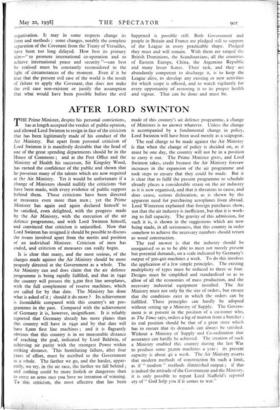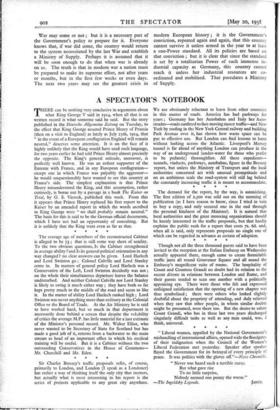AFTER LORD SWINTON
THE Prime Minister, despite his personal convictions, has at length accepted the verdict of -public opinion, and allowed Lord Swinton to resign in face of the criticism that has been legitimately made of his conduct of the Air Ministry. But apart from personal criticism of Lord Swinton it is manifestly desirable that the head of one of the great spending departments should be in the House of Commons ; and at the Post Office and the Ministry of Health his successor, Sir Kingsley Wood, has earned the confidence of the public and shown that he possesses many of the talents which are now required at the Air Ministry. Yet it would be unfortunate if a change of Ministers should nullify the criticisms 'hat have been made, with every evidence of public support behind them. Those criticisms have been directed at measures even more than men ; yet the Prime Minister has again and again declared himself to be satisfied, even delighted, with the progress made by the Air Ministry, with the execution of the air defence programme, and with Lord Swinton himself, and convinced that criticism is unjustified. Now that Lord Swinton has resigned it should be possible to discuss the issues involved apart from the merits and position of an individual Minister. Criticism of men has ended, and criticism of measures can really begin.
It is clear that many, and the most serious, of the charges made against the Air Ministry should be more properly directed at the Government as a whole. The Air Ministry can and does claim that the air defence programme is being rapidly fulfilled, and that in 1940 the country will possess the 3,500 first line aeroplanes, with the full complement of reserve machines, which are called for by that date. The Ministry has done what is asked of it ; should it do more ? Its achievement is formidable compared with this country's air pro- grammes in the past. Compared with the achievement of Germany it is, however, insignificant. It is reliably reported that Germany already has more planes than this country will have in 1940 and by that date will have 8,000 first line machines ; and it is flagrantly obvious that this country is in no measurable distance of reaching the goal, indicated by Lord Baldwin, of achieving air parity with the strongest Power within striking distance. This humiliating failure, after four years of effort, must be ascribed to the Government as a whole. The farther we go, and the harder, appar- ently, we try, in the air race, the farther we fall behind ; and nothing could be more foolish or dangerous than to enter an arms race you have no intention of winning. To this criticism, the most effective that has been made of this country's air defence programme, a change of Ministers is no answer whatever. Unless the change is accompanied by a fundamental change in policy, Lord Swinton will have been used merely as a scapegoat.
The real charge to be made against the Air Ministry is that when the change of policy is decided on, as it must be one day, the country will not be in a position to carry it out. The Prime Minister gives, and Lord Swinton takes, credit because the Air Ministry foresaw increases in the expansion of the air programme and took steps to ensure that they could be made. But it is clear that to fulfil the present programme to schedule already places a considerable strain on the air industry as it is now organised, and that it threatens to cause, and does cause, serious dislocation, as is shown by the apparent need for purchasing aeroplanes from abroad. Lord Winterton explained that foreign purchases show, not that the air industry is inefficient, but that it is work- ing to full capacity. The gravity of this admission, for such it is, is shown in the suggestions which are now being made, in all seriousness, that this country in order somehow to achieve the necessary numbers should return to wood construction.
The real answer is that the industry should be reorganised so as to be able to meet not merely present but potential demands, on a scale indicated by Germany's output of 300-400 machines a week. To do this involves the application of a few simple principles. The existing multiplicity of types must be reduced to three or four. Designs must be simplified and standardised so as to allow of all the economies of mass production, and the necessary industrial equipment installed. The Air Ministry must not only fix the size of orders, but ensure that the conditions exist in which the orders can be fulfilled. These principles can hardly be adopted without setting up a Ministry of Supply. The Govern- ment is at present in the position of a customer who, as The Times says, orders a leg of mutton from a butcher ; its real position should be that of a great store which has to ensure that its demands can always be satisfied. Without a Ministry of Supply and Co-ordination that assurance can hardly be achieved. The creation of such a Ministry enabled this country during the last War to produce some 30,000 machines a year ; its present capacity is about 4o a week. The Air Ministry asserts that modern methods of construction fix such a limit, as if " modern " methods diminished output ; if that is indeed the attitude of the Government and the Ministry, it is only possible to repeat Lord Nuffield's reputed cry of " God help you if it comes to war." War may come or not ; but it is a necessary part of the Government's policy to prepare for it. Everyone knows that, if war did come, the country would return to the system necessitated by the last War and establish a Ministry of Supply. Perhaps it is assumed that it will be soon enough to do that when war is already on us. The truth is that in modern war a nation must be prepared to make its supreme effort, not after years or months, but in the first few weeks or even days. The next two years may see the greatest crisis in modern European history ; it is the Government's conviction, repeated again and again, that this country cannot survive it unless armed in the year to at least a one-Power standard. All its policies are based on that conviction ; but it is clear that since the standard is set by a totalitarian Power of such immense in- dustrial capacity as Germany, this country cannot reach it unless her industrial resources are co- ordinated and mobilised. That postulates a Ministry of Supply.



















































 Previous page
Previous page